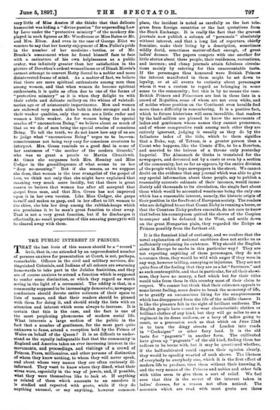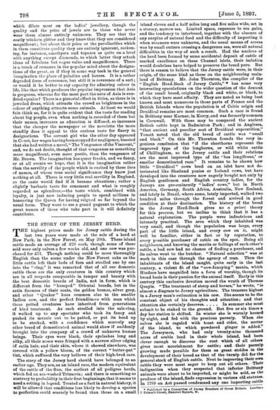THE PUBLIC INTEREST IN PRINCES.
THAT the last levee of this season should be a " record" ievge, that is, one attended by an unprecedented number of persons anxious for presentation at Court, is not, perhaps, remarkable. Officers in the civil and military services, dis- tinguished Colonials, and Indians of all colours are swarming homewards to take part in the Jubilee festivities, and they are of course anxious to attend a function which is supposed to confer some distinction, or which they regard as worth seeing in the light of a ceremonial. The oddity is that, in a community supposed to be increasingly democratic, newspaper conductors should devote entire columns of their space to lists of names, and that their readers should be pleased with them for doing it, and should study the lists with an attention and interest which seem always to increase. It is certain that this is the case, and the fact is one of the most perplexing phenomena of modern social life. What interests a large section of the public in the fact that a number of gentlemen, for the most part quite unknown to fame, attend a reception held by the Prince of Wales on behalf of the Queen ? It is as difficult to under- stand as the equally indisputable fact that the community in England and America takes an ever increasing interest in the movemente, and proceedings, and visitings of a crowd of Princes, Peers, millionaires, and other persons of distinction of whom they know nothing, to whom they will never speak, and about whose very names they are often curiously ill- informed. They want to know where they dined, what their wives wore, especially in the way of jewels, and, if possible, what they were themselves like to look at. If anything to related of them which amounts to an anecdote it ul studied and repeated with gusto, while if they do anything unusual, or say anything, however common- place, the incident is noted as carefully as the last tele.. gram from foreign countries or the last quotations from the Stock Exchange. It is really the fact that the gravest journals now publish a column of " personals " absolutely without interest, and that a long list of reporters, chiefly feminine, make their living by a description, sometimes wildly florid, sometimes matter-of-fact enough, of great ladies' dresses. The papers compete with one another for little stories about these people, their residences, recreations, and incomes ; and cheap journals attain fabulous circula- tions mainly by catering for this unaccountable taste. If the personages thus honoured were British Princes the interest manifested in them might be set down to loyalty, or at all events to curiosity about personages whom it was a custom to regard as belonging in some sense to the community ; but this is by no means the case. British Princes and Princesses are lost in these lists in a crowd of Royalties, some of whom are not even white, and of nobles whose position on the Continent even heralds find more than a difficulty in remembering. It is a positive fact, which to future historians will seem incredible, that readers by the half-million are pleased to know the movements of ladies and gentlemen whose names they cannot pronounce, and of whose comparative rank among each other they are entirely ignorant, judging it usually as they do by the fallacious index of the title, which to them signifies that a Duke, say, of Tetuan, is a greater person than a Count who happens, like the Comte d'En, to be a Bourbon, and married to the heiress of a throne only yesterday Imperial. The Almanach de Gotha is translated for the newspapers, and devoured not by a caste or even by a section of the community, but so far as appears, by the entire division of the people which buys newspapers in the street.. We cannot doubt on the evidence that any journal which was able to give any special information about these people, say to publish a reasonably accurate estimate of their incomes, would imme- diately add thousands to its circulation, the single fact about them which would be accounted wearisome being the only one which has a reasonable interest, namely, the historic origin of their position in the forefront of European society. The readers who are delighted to see that Count Zichy is running a horse, or that the Countess Zichy prefers emeralds, do not care to know that before his countrymen quitted the shores of the Caspian to conquer and be defeated in the West, and settle down on the great Hungarian plain, they regarded the Zichys as Princes possibly from the farthest eld.
It is the funniest kind of curiosity, and we confess that the usual explanation of national snobbism does not strike us as sufficiently explaining its existence. Why should the English alone in Europe be snobs in this particular way ? They are not expecting anything of these personages, they do not reverence them, they would be wild with anger if they were in any way, however trifling, annoying or injurious. They are not quite free of the feeling that they are as a lot " furriness," and as such contemptible, and that in particular, for all their showi- ness, they have no money, a fact which but for their titles would take from them in this country most of their claim to respect. We cannot but think that their existence appeals to some latent feeling, some desire to break the monotony of life, or to gratify an unconscious liking for the sumptuousness which has disappeared from the life of the middle classes. It is like the pleasure felt in the sight of brilliant uniforms. The English people have ceased to wear characteristic clothes or brilliant clothes of any kind, but they will go miles to see a regiment in its dress uniform, or a bevy of ladies going to court, or a procession such as that which on June 22nd is to tarn the dingy streets of London into roads in " Cockaigne " or other fairy land. It is the old taste for 'pageants" in another form. The cultivated have given up " pageants " of the old kind, finding them too tedious to be borne with, but it may be questioned whether, if the half-cultivated could express their opinion clearly, they would be speedily wearied of such shows. The likeness of everybody to everybody else, which it is the first effect of modern life to produce, tires them without their knowing it, and the very names of the Princes and nobles and other folk with titles seem to give them a sort of relief. We feel sure that this is the secret of the interest taken in ladies' dresses, for a reason not often noticed. The accounts which are read with most gusto are those
which dilate most on the ladies' jewellery, though the quality and the price of jewels are to those who never wear them almost entirely unknown. They see that the costly trinkets glitter and they know that they are considered magnificent ; but about their price or the peculiarities which in them constitute quality they are entirely ignorant, reckon- ing, for instance, amethysts and topazes as quite on a level with anything except diamonds, to which latter they attach ideas of fabulous but vague value and magnificence. There is a touch of romance in the popular mind about the designa- tions of the great, as if they in some way took in the general imagination the place of paladins and heroes. It is a rather degraded form of reverence, but still it is reverence of a sort ; or would it be better to say capacity for admiring colour in life, like that which produces the popular impression that Asia is gorgeous, whereas for the most part the note of Asia is sun- dried squalor? There is a pictorial effect in titles, as there is in jewelled dress, which attracts the crowd as brightness in the colour of anything attracts some animals. At least we would fain think so, for it is quite evident that the taste for reading about big people, even when nothing is recorded of them but their names, increases as education is diffused, so increases that the cheaper the newspaper or the novelette the more steadily does it appeal to this curious taste for finery in designations. The servant girl who the other day appeared in Court, her wages havingbeen stopped for negligence, boasted that she had written a novel," The Vengeance of the Viscount," and, we do not doubt, thought of that vengeance as something more magnificent, even more poetic, than the vengeance of Mr. Brown. The imagination has queer freaks, and we fancy, or at all events we hope, that it is the imagination rather than the servility of the people which is excited by these lists of names, of whose true social significance they know just nothing at all. There is very little real servility in England, as the caste would find if it became obnoxious ; rather a slightly barbaric taste for ornament and what is roughly regarded as splendour,—the taste which, combined with loyalty, is just now inducing people to spend millions in honouring the Queen for having reigned so far beyond the usual term. They want to see a grand pageant to which the great names of those who take part in it will definitely contribute.







































 Previous page
Previous page